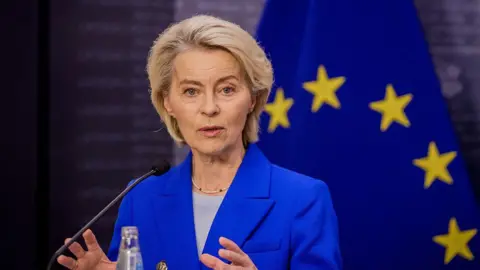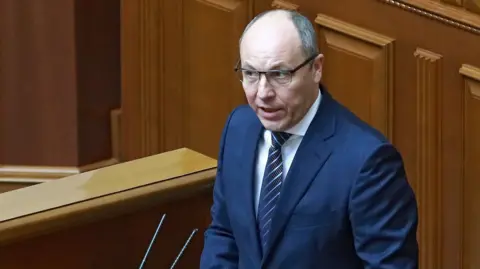In an intense Senate confirmation hearing on Tuesday, Mike Waltz, nominated by former President Donald Trump as the U.S. ambassador to the United Nations, was put on the hot seat regarding his involvement in a leaked Signal chat that discussed sensitive military plans. The hearing comes in the wake of Waltz's controversial removal from his previous role as national security adviser in May, with allegations surfacing over his conduct involving classified communication.
During questioning, Waltz was held accountable by several Democratic senators, particularly over what is being called "Signalgate," referring to an incident in March where a journalist inadvertently joined the Signal group chat that included high-profile officials, like Secretary of Defense Pete Hegseth and Secretary of State Marco Rubio. The conversation in the chat revolved around a potential military strike against the Houthi rebel group in Yemen.
While Waltz defended his actions, asserting that no classified information was shared, he faced skepticism from Senator Chris Coons of Delaware, who emphasized the inappropriateness of discussing critical military intelligence on a broadly accessible chat platform like Signal. Coons expressed a desire to hear Waltz’s acknowledgment of the severity of the situation.
Waltz, however, maintained that his actions were backed by cybersecurity recommendations from the Biden administration and insisted on the security protocol surrounding the chat's creation. Amid the proceedings, he mentioned investigations were being conducted by both the White House and the Department of Defense regarding the incident.
Republican senators, in contrast, diverted attention from the Signal leak, focusing instead on relevant United Nations funding issues and geopolitical challenges, including China's rising influence. Senator Rick Scott from Florida praised Waltz for his integrity, underscoring a stark divide in party lines as members sought to position Waltz for a prominent role in the U.S. representation at the UN.
Waltz emphasized the importance of reviewing U.S. funding to international organizations, committing to ensure taxpayer dollars are utilized effectively. The position he seeks to occupy is pivotal as America's global standing comes under scrutiny following previous administrations' cuts in foreign aid and staffing reductions within the State Department.
Amid the contentious backdrop of American foreign policy, Waltz's nomination will likely pass in a Senate where Republicans maintain the majority, although concerns over cybersecurity and military integrity remain central to discussions surrounding his bid for the UN ambassadorship.
During questioning, Waltz was held accountable by several Democratic senators, particularly over what is being called "Signalgate," referring to an incident in March where a journalist inadvertently joined the Signal group chat that included high-profile officials, like Secretary of Defense Pete Hegseth and Secretary of State Marco Rubio. The conversation in the chat revolved around a potential military strike against the Houthi rebel group in Yemen.
While Waltz defended his actions, asserting that no classified information was shared, he faced skepticism from Senator Chris Coons of Delaware, who emphasized the inappropriateness of discussing critical military intelligence on a broadly accessible chat platform like Signal. Coons expressed a desire to hear Waltz’s acknowledgment of the severity of the situation.
Waltz, however, maintained that his actions were backed by cybersecurity recommendations from the Biden administration and insisted on the security protocol surrounding the chat's creation. Amid the proceedings, he mentioned investigations were being conducted by both the White House and the Department of Defense regarding the incident.
Republican senators, in contrast, diverted attention from the Signal leak, focusing instead on relevant United Nations funding issues and geopolitical challenges, including China's rising influence. Senator Rick Scott from Florida praised Waltz for his integrity, underscoring a stark divide in party lines as members sought to position Waltz for a prominent role in the U.S. representation at the UN.
Waltz emphasized the importance of reviewing U.S. funding to international organizations, committing to ensure taxpayer dollars are utilized effectively. The position he seeks to occupy is pivotal as America's global standing comes under scrutiny following previous administrations' cuts in foreign aid and staffing reductions within the State Department.
Amid the contentious backdrop of American foreign policy, Waltz's nomination will likely pass in a Senate where Republicans maintain the majority, although concerns over cybersecurity and military integrity remain central to discussions surrounding his bid for the UN ambassadorship.





















